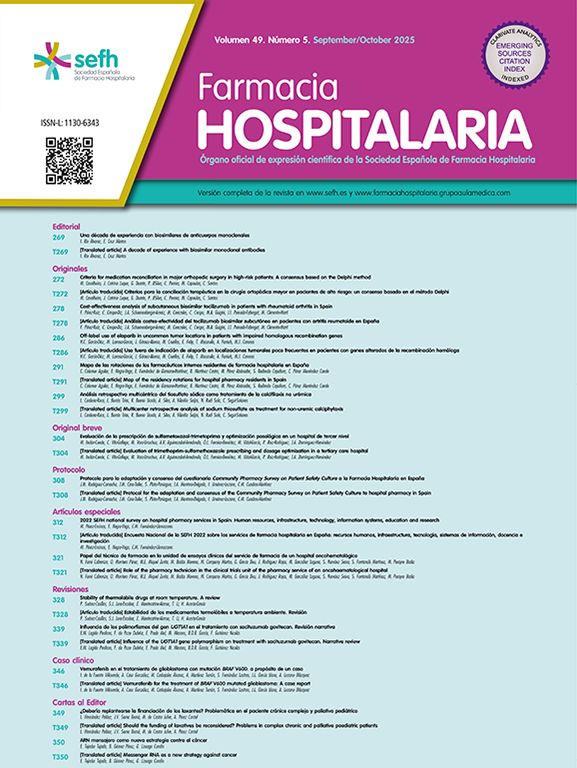La revista Farmacia Hospitalaria es un órgano de expresión científica de la Sociedad Española de Farmacéuticos de Hospital (SEFH), una organización profesional y científica que cuenta en la actualidad con unos 4.351 socios.
La Misión de la revista Farmacia Hospitalaria es servir de apoyo a los profesionales de la salud para dar a conocer sus proyectos, publicaciones y programas de formación, y promover el intercambio de experiencias.
La Visión de Farmacia Hospitalaria es:
- Aumentar el estado del conocimiento sobre la Farmacia Hospitalaria y de aquellas acciones que incrementen el uso adecuado y seguro de los medicamentos y productos sanitarios.
- Ser un instrumento de intercambio y difusión del conocimiento científico de la práctica farmacéutica en la mejora del uso y seguridad de medicamentos y los resultados en salud.
Es una revista científica de revisión por pares, doble ciego, cuyo objetivo es publicar los avances en el desarrollo profesional de la especialidad de Farmacia Hospitalaria, así como los relacionados con la terapia farmacológica. La revista incluye los siguientes temas: Evaluación de medicamentos. Calidad de vida. Medida de resultados informados por el paciente (PROM) y de la experiencia informada por el paciente (PREM) en el uso de medicamentos. Seguridad. Seguimiento de la medicación. Elaboración de medicamentos. Administración de medicamentos. Gestión de Servicios de Farmacia (logística, control de calidad). Tecnologías y sistemas de información en el proceso de uso de medicamentos. Productos sanitarios. Educación al paciente. Papel del farmacéutico en la sociedad y/o en el Sistema de Salud en España. Otros temas relacionados con el papel clínico, científico e institucional del farmacéutico hospitalario.
Publica bimestralmente (6 números al año), artículos originales, originales breves, artículos de revisión, casos clínicos, artículos especiales, protocolos, documentos de consenso, guías clínicas, cartas al editor y editoriales. Todos los artículos son publicados en español y en inglés, independientemente de la lengua en que se reciban.
Es una revista Open Access, lo que implica que todo su contenido es accesible libremente sin cargo para el usuario o su institución. Los usuarios están autorizados a leer, descargar, copiar, distribuir, imprimir, buscar o enlazar a los textos completos de los artículos de esta revista sin permiso previo del editor o del autor, de acuerdo con la definición BOAI de Open Access. La reutilización de los trabajos puede hacerse en los términos que diga la licencia Creative Commons 4.0. (CC BY-NC-ND). La utilización de los materiales dentro de la Licencia Creative Commons indicada estará sujeta a la autorización de la SEFH propietaria de los artículos.
La revista Farmacia Hospitalaria no cobra tasas por el envío de trabajos, ni tampoco cuotas por la publicación de sus artículos.
Adherencia a recomendaciones éticas internacionales
Los manuscritos deben elaborarse siguiendo las recomendaciones del Comité Internacional de directores de Revistas Médicas en su última versión (disponible en http://www.icmje.org).
Los artículos en Farmacia Hospitalaria están indexados en PubMed y otras 17 bases de datos científicas:
- Bases de datos de evaluación: MEDLINE, DOAJ, Scopus, Latindex y Scimago Journal and Country Rank (SJR). Índice H: 18, cuartil 3 (Medicine, miscellaneous / Pharmacology).
- Bases de datos bibliográficas: CINHAL, EMBASE Excerpta Medica, Índice Bibliográfico Español en Ciencias de la Salud (IBECS), Índice Español de Ciencia Y Tecnología (ICyT), Índice Médico Español (IME), International Pharmaceutical Abstracts (IPA).
- Colecciones de revistas: Dialnet, Medes, Scientific Electronic Library Online (SciELO), REDIB, ScienceDirect, ClinicalKey.





